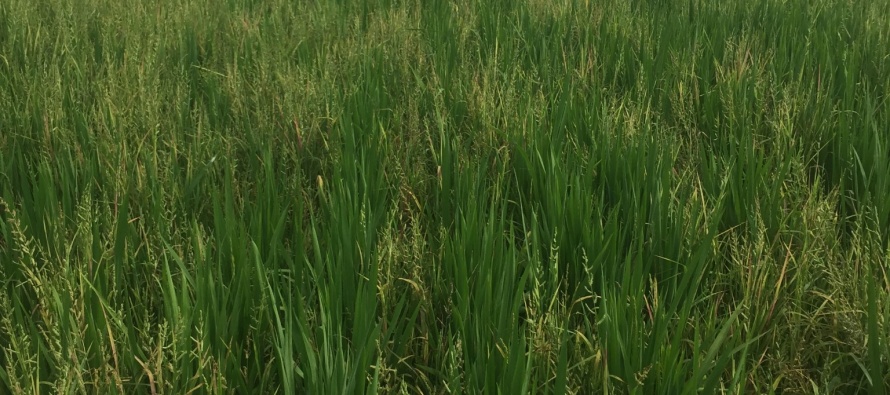Barnyardgrass Management in the Mississippi Delta

Related Articles
- 2010 Soybean And Corn Variety Trial Data 3 10.Jan
- Rice Variety Trial Results For 2010, Plus Rice Research Report 0 12.Jan
- Flag The Technology 0 03.Feb
Latest Tweets
Barnyardgrass resistant to Newpath was confirmed in Sunflower County, Mississippi, in 2010. Two additional Newpath-resistant populations were identified in Bolivar and Washington counties in 2011. Since that time, barnyardgrass populations resistant to acetolactate synthase- (ALS)-inhibiting herbicides (herbicide Group 2) have been identified in most rice-producing counties in the Mississippi Delta. Most of these populations are also cross resistant to other ALS herbicides such as Regiment and Grasp.
Most barnyardgrass control programs in corn, cotton, and soybean are based on glyphosate. Every year there are numerous complaints about barnyardgrass control with glyphosate. Among the causes of poor glyphosate performance on barnyardgrass are improper application timing, poor spray water quality (pH or hard water), new emergence following application, or dry/wet conditions. Barnyardgrass populations are collected annually from fields in the Mississippi Delta and screened for their response to glyphosate. To date, all of these populations have been controlled in the greenhouse. However, it is common to hear that a higher glyphosate rate is required to control barnyardgrass in the field than in years past.
In the Roundup Ready age, a rice-soybean rotation has been a good tool for managing barnyardgrass. With some exceptions, glyphosate has reliably controlled barnyardgrass, so the herbicide modes of action used for barnyardgrass control in rice have only occasionally been utilized in soybean. Furthermore, where glyphosate-resistant Palmer amaranth is a problem, products containing S-metolachlor (Dual Magnum, Boundary, Prefix, Sequence) are used extensively. S-metolachlor provides good to excellent residual control of barnyardgrass, so barnyardgrass is often controlled as a result of efforts to manage glyphosate-resistant Palmer amaranth. Rotating crops and herbicide modes of action as well as utilizing residual herbicides are all excellent resistance management techniques.
When crop rotation is used as a tool to manage a particular weed species, then care should be taken to completely control that weed in the rotational crop. For instance, if glyphosate-resistant Palmer amaranth is not controlled in the corn year of a cotton-corn rotation or if it is allowed to grow and produce seed after corn harvest, then the positive benefits of using corn to reduce the Palmer amaranth population are negated. The same concept holds true for barnyardgrass control in a rice-soybean rotation. If barnyardgrass is left uncontrolled in the soybean crop or is not managed after harvest, it will have to be dealt with during the following year’s rice crop.
Barnyardgrass is the most troublesome weed in Mississippi rice. Barnyardgrass that is allowed to survive and produce seed in soybean can cripple a rice weed control program the following year. Fewer barnyardgrass escapes means less seed production, which in turn could impact herbicide applications in next year’s rice crop.
General suggestions for controlling barnyardgrass in rice and soybean include:
- Ensure that no barnyardgrass is emerged at planting.
- Always use full rates of herbicides.
- Every spray application should contain multiple herbicide modes of action that exhibit pre- and postemergence activity on barnyardgrass. For example, Newpath plus RiceBeaux in the first postemergence application in Clearfield rice or glyphosate plus S-metolachlor in soybean.
- Time postemergence applications appropriately to optimize herbicide efficacy and spray coverage.
- Prevent late-season escapes that will contribute to the weed soil seed bank.
No Comments
Write a comment
Subscribe to receive updates
More Info By
Subject
Editors
- Allen, T. (380)
- Bond, J. (184)
- Calhoun, J. (0)
- Catchot, A. (394)
- Cook, D. (289)
- Crow, W. (108)
- Dodds, D. (241)
- Eubank, W. (1)
- Gholson, D. (29)
- Golden, B. (117)
- Gore, J. (359)
- Henn, A. (41)
- Irby, T. (172)
- Larson, E. (315)
- Little (0)
- Maples, W. (1)
- Mills, B (8)
- MSU Extension Service (39)
- Musser, F. (216)
- N. (0)
- Oldham, L. (83)
- Pieralisi, B. (22)
- Towles, T. (34)
- Wilkerson, T. (14)
- Zurweller, B. (8)






Let me tell You a sad story ! There are no comments yet, but You can be first one to comment this article.
Write a comment